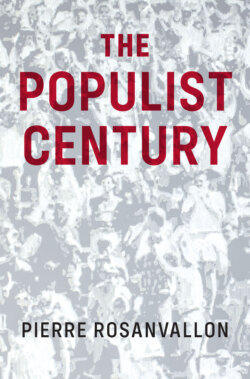Читать книгу The Populist Century - Pierre Rosanvallon - Страница 5
INTRODUCTION: CONCEPTUALIZING POPULISM
ОглавлениеPopulism is revolutionizing twenty-first-century politics. But the disruption it brings has not yet been assessed with any degree of accuracy. The word may turn up everywhere, but no theory of the phenomenon has emerged. The term combines a look of intuitive self-evidence with a fuzzy form, as attested first and foremost by the semantic slipperiness manifested in its usage. For it is a decidedly malleable word, so erratic are its uses. The term is paradoxical, too: even though it is derived from the positive foundations of democratic life, it most often has a pejorative connotation. It is also a screen word, for it applies a single label to a whole set of contemporary political mutations whose complexity and deepest wellsprings need to be grasped. Is it appropriate, for instance, to use the same term to characterize Chávez’s Venezuela, Orbán’s Hungary, and Duterte’s Philippines, not to mention a figure like Trump? Does it make sense to put the Spaniards of Podemos and the followers of Jean-Luc Mélenchon’s movement, La France Insoumise (France Unbowed), in the same basket with the fervent supporters of Marine Le Pen, Matteo Salvini, or Nigel Farage? To understand something requires making distinctions; it is essential to resist simplifying amalgamations. Populism is a dubious notion, finally, because it often serves only to stigmatize adversaries, or to legitimize old claims by the powerful and the educated that they are superior to the “lower” classes, which are always deemed likely to mutate into plebeians governed by sinister passions. We cannot address the question of populism without keeping this observation in mind, as a caveat as well as a call for political lucidity and intellectual rigor in approaching the subject.
This necessary attention to the pitfalls that underlie the term “populism” must not lead us to stop using it, however, for two reasons. First, because in its very confusion it has proved unavoidable. If it has stuck to everyone’s lips and remains on everyone’s pen, despite all the reservations just mentioned, it is also because the term has responded, imprecisely but insistently, to a felt need to use new language to characterize an unprecedented dimension of the political cycle that has opened up at the turn of the twenty-first century – and because no competing term has surfaced so far. The newly launched political cycle is described by some as a pressing social expectation that the democratic project will be revitalized as the path of a more active sovereignty on the part of the people is rediscovered; others see it, conversely, as bearing signs that announce a threatening destabilization of that same project of revitalization. But the second decisive fact is that the term has been adopted with pride by political leaders seeking to pillory those who use it for the purpose of denunciation.1 We could make a long list of figures on the right and the far right who have sought to overturn the stigma, first by saying that the word didn’t scare them, and then by espousing it, over time. There has been a parallel evolution on the left, as attested in France in exemplary fashion by Jean-Luc Mélenchon: “I have no desire at all to defend myself against the accusation of populism,” he said as early as 2010. “It’s the elites expressing their disgust. Out with them all! Me, a populist? Bring it on!”2 The fact that a certain number of intellectuals have become advocates of a “left populism” has also helped considerably to give the term a desirable consistency and to make it common currency as a political designation. The positions and writings of Wendy Brown, Nancy Fraser, Ernesto Laclau, and Chantal Mouffe have weighed heavily in this direction, encouraging the retention of the word and validating the appropriateness of its use.
